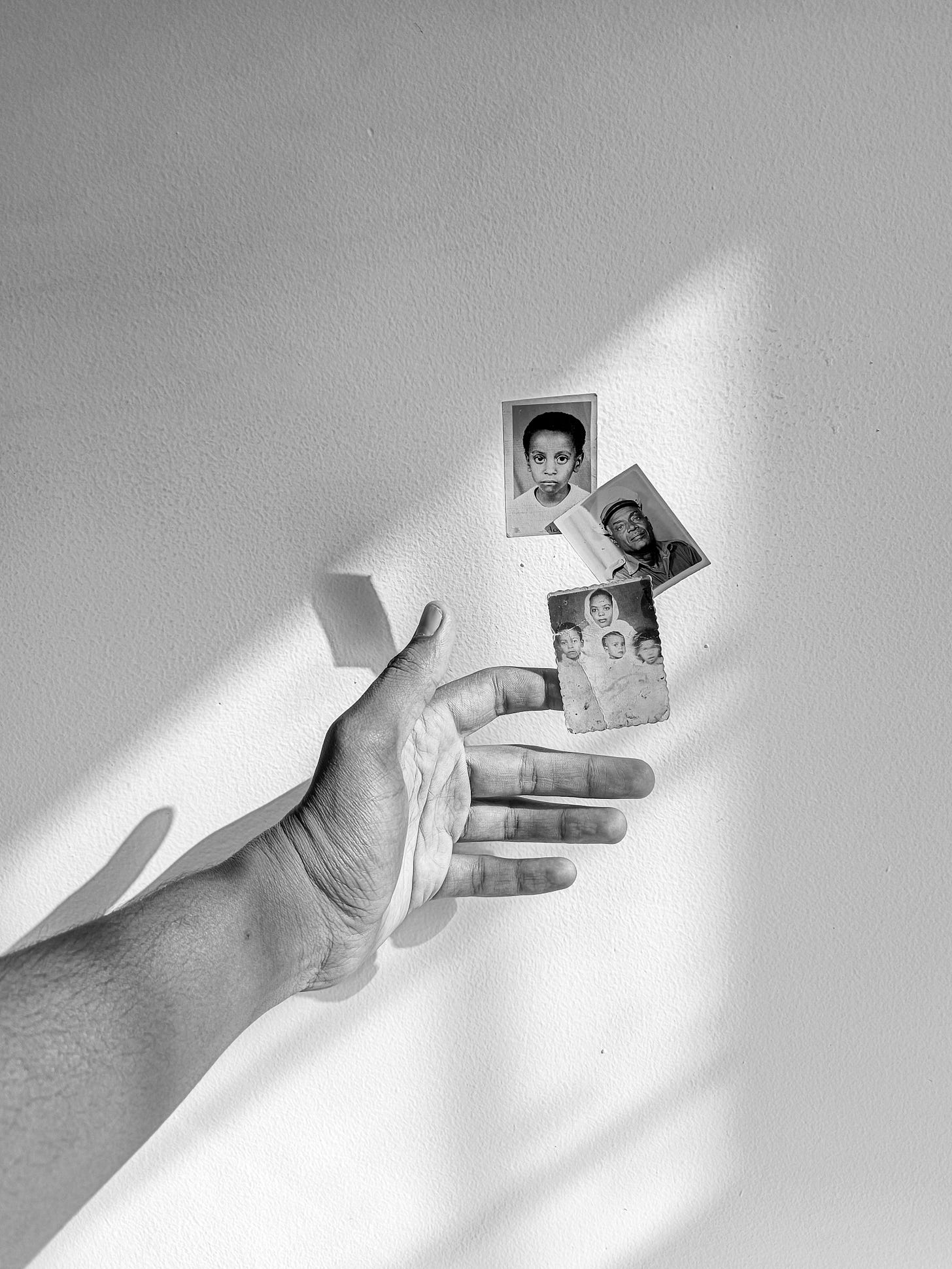A car opposite a gate: a fact so indisputable almost nothing else can be said about this picture. But there is also the hint of other realities, even if less factual. For instance, the gap between those red teacups—and the lack of any liquid rising to the top—indicate an ongoing or past meeting. It is still morning, but the day is already filled with such reverberations of encounters, as noiseless as the parked car.
— Emmanuel Iduma
“Photography is a way to check myself, remain grounded, and be of service.”
While interrogating the architectural landscape of Dube Village, in Soweto, I walked up Thabo Street and came across a group of men sitting under a tree. They were listening to soft music; it was a Sunday morning.
These men are locally known for illegal activities. When I approached them for an impromptu group photo, they swiftly agreed given that they have known me since a tender age.
While doing so, two men who were nursing a cup of tea with whiskey rose from their chairs and placed the cups on the boot of the BMW M5.
I knew that was the photograph. We shot the group photograph and then I went on to position the cups together. They watched in awe. I expressed my gratitude; they asked that I represent where I come from with pride and then parted ways.
Historically, Dube Village is one of the oldest ”suburbs,” in Soweto township, originally established for the “elite” group of that time, also known as the middle class citizens. Entertainers, writers, medical practitioners, struggle icons, war veterans and more.
It has changed throughout the years. However, it somehow still maintains its heritage of class and status to date.
I like the geometry of the notorious BMW, locally known as ”matchbox” for its box-like shape. The regulation 6, 7, and 8 settlements of Soweto are also known as “matchbox houses.” This photograph, with a little bit of flavour, immediately resembles Dube Village and its historic background.
Photography is a form of therapy to engage, consult, reflect, negotiate and develop the traumas caused by conditions of my immediate environment. It is a way to check myself, remain grounded and most importantly be of service to those around me who may not be in a position of having necessary tools to access the history around them.
There's an isiZulu saying, “Ngeke wazi la uyakhona uma ungazi la uvela khona,” which translates to, “You may not know where you are going when you do not know where you come from.”
— Luyolo Fihla
Post-Card Africa
Tender Photo is collaborating with Through The Lens Collective to present photographs from Post-Card Africa, a project designed to create new and insightful responses to the history of African representation through photography. Images such as Luyolo Fihla’s “Cartel Talk,” taken in Soweto, South Africa, evoke a new local archive, by approaching creative agency and shared opportunity for local representation as an important framework for actively engaging the continent’s very complex history and representation. Read more about the project here.
About Luyolo Fihla
Born and raised in Soweto, Gauteng, South Africa, Luyola Fihla is based between Soweto and Johannesburg. His work is mostly about my personal lived experiences, home, architecture and planning, relationships and fashion. See more of his work on his website.
Last Week: “Family Tree” by Hashim Nasr
As a self-taught photographer, photography is an attempt to create a parallel and imaginary world for the viewer of the image, to escape from experiencing reality in one way or another. This would lead me to my approach to photography, which has always been to work with minimal artworks, particularly photographing hands and creating conceptual, editorial portraits with an avant-garde take to them. I am trying to find a link between those two directions of photography.
Read more.
Support Tender Photo
This is the 62nd edition of this publication.
The newsletter can also read on web (best for viewing images), and via the Substack iOS/Android apps. Every Wednesday I feature one photograph and the photographer who took it: you’d read a short caption from me, and a statement from the photographer. And every Saturday I publish a lengthier engagement with photography. My goal is to support early to mid-career African photographers by engaging with their work, and to create a platform in which photographers lead the cataloguing and criticism of their work. If this newsletter was shared with you, consider subscribing, or forward to a friend. Please whitelist the newsletter to ensure you never miss it.





